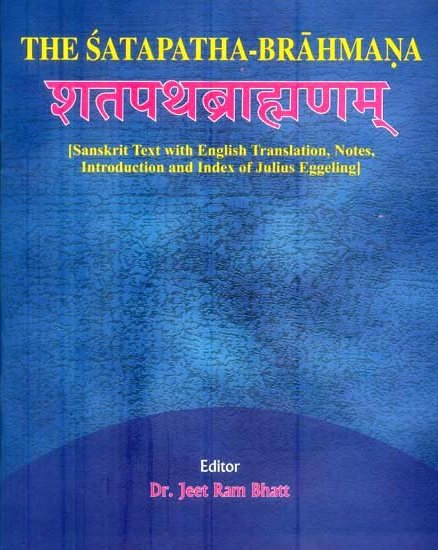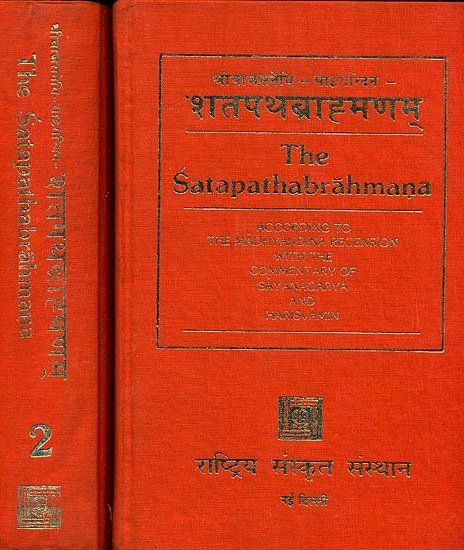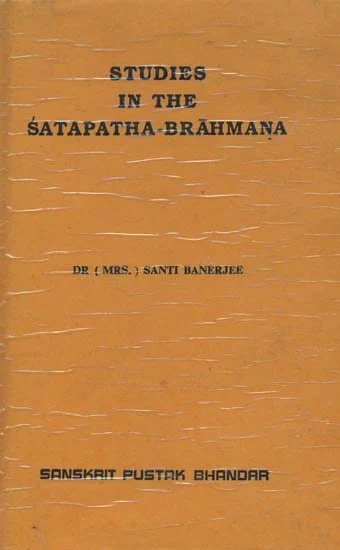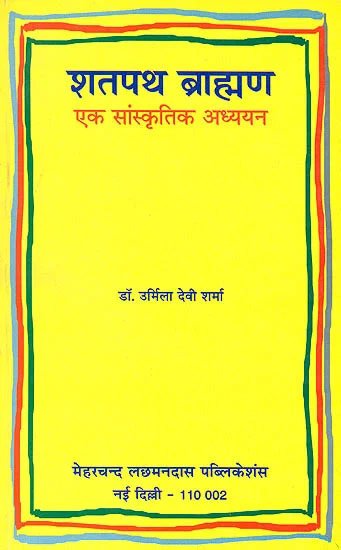Satapatha-brahmana [sanskrit]
147,532 words | ISBN-10: 812080113X | ISBN-13: 9788120801134
The Sanskrit text of the Satapatha-brahmana: One of the largest works in the category of Vedic (Brahmaic) literature, narrating in extensive detail the various rites, constructions, chants and utensils to be used in Hindu ceremonies. Alternative titles: Śatapathabrāhmaṇa (शतपथब्राह्मण), Śatapatha-brāhmaṇa (शतपथ-ब्राह्मण) Shatapathabrahma (shatapatha).
Verse 1.9.2.35
tato devāḥ | sarvaṃ yajñaṃ saṃvṛjyātha yatpāpiṣṭhaṃ yajñasya bhāgadheyamāsīttenainānnirabhajannasnā paśoḥ phalīkaraṇairhaviryajñātsunirbhaktā asannityeṣa vai sunirbhakto yam bhāginaṃ nirbhajantyatha yamabhāgaṃ nirbhajantyaiva sa tāvacaṃsata uta hi vaśo labdhvāha kim mā babhaktheti sa yamevaibhyo devā bhāgamakalpayaṃstamevaibhya eṣa etadbhāgaṃ karotyatha yadadho'dhaḥ kṛṣṇājinamupāsyatyanagnāvevaibhya etadandhe tamasi praveśayati tatho evāsṛkpaśo rakṣasām bhāgo'sītyanagnāvandhe tamasi praveśayati tasmātpaśostedanīṃ na kurvanti rakṣasāṃ hi sa bhagaḥ
Preview of English translation:
35. Thereupon the gods obtained possession of the whole of the sacrifice, and dispossessed those (Asuras) of it by (giving them) what was the worst part of the sacrifice, to wit, with the blood of the victim (they dispossessed them) of the animal sacrifice, and with the refuse of the rice of the haviryajna. “May they be duly dispossessed of the sacrifice,” they thought for he indeed is duly dispossessed, who is dispossessed even while obtaining a (worthless) share. He, on the other hand, who is dispossessed without any share whatever, hopes for a while, and when it occurs to him, he says, “What share hast thou given me?” Hence what share the gods set apart for those (Asuras), that same share he now makes over to them in pouring (the refuse of the rice) right under the black antelope skin. He thereby casts it into blind darkness, where there is no (sacrificial) fire. And in the same way he casts the blood of the victim into blind darkness, where there is no fire; thinking, “Thou art the Rakshas” share!' For this reason they use not the gore of the victim (for sacrificial purposes), since it is the Rakshas' share.
For a detailled translation, including proper diacritics and footnotes, go the full English translation.
Other editions:
Also see the following editions of the Sanskrit text or (alternative) English translations of the Satapatha-brahmana Verse 1.9.2.35
The Satapatha Brahmana (In Five Volumes)
by Julius Eggeling (1882)
2551 pages; [Publisher: Motilal Banarsidass Publishers Pvt. Ltd.]
Buy now!
The Satapatha Brahmana (3 volumes)
by Dr Jeet Ram Bhatt (2009)
Sanskrit Text with English Translation; 1726 pages; [Publisher: Eastern Book Linkers]; ISBN: 9788178541693
Buy now!
The Satapatha Brahmana (With The Commentary of Sayanacarya and Harisvamin)
by Rashtriya Sanskrit Sansthan (2002)
3483 pages; [शतपथ ब्राह्मणम्] According to the Madhyandina Recension; Commetaries: (1) Vedarthaprakash (Vedartha-prakasha) by Shrimat-Trayibhashyakar Sayanacharya, (2) Sarvavidyanidhana Kavindracharya Saraswati.
Buy now!
Studies in the Satapatha-Brahmana
by Dr. (Mrs.) Santi Banerjee (1993)
236 pages; [Publisher: Sanskrit Pustak Bhandar]
Buy now!
Cultural Study of the Satapatha Brahman (in Hindi)
by Dr. Urmila Devi Sharma (1982)
106 pages; Shatapatha Brahmana Ek Sanskritik Adhyan; [Publisher: Meharchand Lakshmandas Publications]
Buy now!![Satapatha-brahmana [sanskrit] - book cover](/uploads/a/NAC457-Satapatha-Brahmana.jpg)



